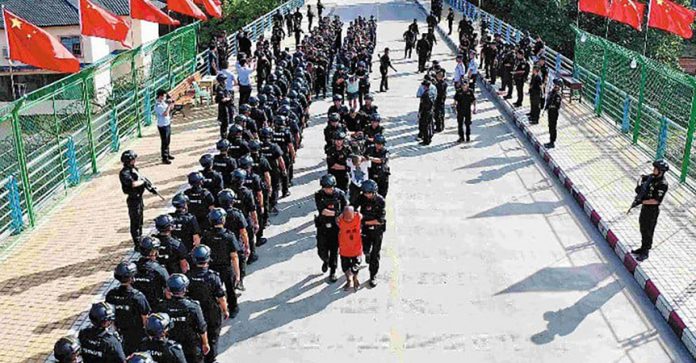Ninety-two Chinese citizens alleged to be involved in online fraud and cyber scam operations were extradited from Myanmar to China on May 6, according to China’s state-run Xinhua news agency. It has been reported that there are at least 1,000 scam centres in Myanmar. More than 100,000 scammers engage in online fraud targeting Chinese citizens every day.
“Since last year, [China] has cooperated with the Myanmar police to crack down on telecom and online fraud crimes. [We have] transferred a total of 49,000 suspects [back] to China,” said the Ministry of Public Security in Beijing.
The U.N. believes that at least 1,200 people have been trafficked to Myanmar and are being forced to work in cyber scam centres.
The Myanmar National Democratic Alliance Army (MNDAA), which controls the Kokang Self Administered Zone, located in northern Shan State, was given tacit approval from Beijing to launch Operation 1027 on Oct. 27 along with its Brotherhood Alliance allies, the Ta’ang National Liberation Army (TNLA) and the Arakan Army (AA).
One of the Brotherhood Alliance’s stated aims was to eradicate online fraud and cyber scam operations along the China-Myanmar border.
The Institute for Strategy and Policy (ISP-Myanmar) stated that there were at least 35 operating in seven towns along the border. Fifteen of the 35 were based in Laukkai, the de facto capital of the Kokang Self Administered Zone, prior to Operation 1027.
Since October, many have closed and moved further south to the Thailand-Myanmar border towns of Tachilek and Myawaddy. At least 25 are now operating around Myawaddy and 15 in Tachilek, added the ISP-Myanmar.
Regime media reported that since October, a total of 50,772 Chinese citizens detained for working at cyber scam centers have been extradited from Myanmar. Over 2,000 other foreign citizens were repatriated to Vietnam, Thailand, India and Indonesia.
“It remains unclear how Chinese citizens involved in the scamming business network are being apprehended and prosecuted,” concluded ISP-Myanmar.
On April 1, China’s Special Representative for Asian Affairs Deng Xijun met with Myanmar’s regime leader Min Aung Hlaing in Naypyidaw. The two discussed stability and peace along the China-Myanmar border.
The National Unity Government (NUG), Myanmar’s democratic alternative to the military regime, stated its concern about human trafficking, which is how many workers are brought from neighboring countries into Myanmar to work as cyber scammers.
Some victims who’ve escaped from cyber scam compounds in Myanmar have shared stories about being forced to work under the threat of violence. Others have provided evidence of abuse and torture at the hands of the scam centre operators.
The NUG announced earlier this year that it would cooperate with regional countries, including China, to crack down on transnational crime. The U.N. estimates that scam centers generate billions of U.S. dollars in revenue per year.
“Online scams and gambling business not only impact the stability and security of the Myanmar-China border but it also affects the overall stability and security of the region,” added the NUG.



